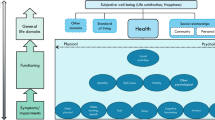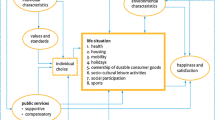Abstract
It is widely accepted that one of the main objectives ofgovernment expenditure on health care is to generate health. Sincehealth is a function of both length of life and quality of life, thequality-adjusted life-year (QALY) has been developed in an attempt tocombine the value of these attributes into a single index number. TheQALY approach – and particularly the decision rule that healthcare resources should be allocated so as to maximise the number of QALYsgenerated – has often been equated with the utilitarian philosophyof maximising `the greatest happiness of the greatest number'. Thispaper considers the extent to which the measurement and aggregation ofQALYs really is utilitarian by developing a new taxonomy in order toclassify utilitarianism and the different aspects of the QALY approach.It is shown that the measurement of QALYs is consistent with a number ofdifferent moral positions and that QALYs do not have to be aggregatedaccording to the maximisation rule. Therefore it is inappropriate tonecessarily equate QALYs with utilitarianism. It is shown thatmuch turns on what in principle the QALY represents and howin practice it can be operationalised. The paper highlights thecategory confusion that is often present here and suggests possibleavenues for future theoretical and empirical research.
Similar content being viewed by others
References
Anand, P. (1999) Procedural fairness in economic and social choice: evidence from a survey of voters, paper presented to the Royal Economic Society, University of Nottingham.
Bentham, J. (1789) An introduction to the principles of morals and legislation, W. Harrison (Ed.), Oxford: Blackwell, 1967.
Bleichrodt, H. and Quiggin, J. (1999) Life-cycle preferences over consumption and health: when is cost-effectiveness analysis equivalent to cost-benefit analysis? Journal of Health Economics 18(6), 681-708.
Boadway, R.W. and Bruce, N. (1984) Welfare Economics, Ch. 6, Oxford: Blackwell.
Broome, J. (1991) Weighing goods, Oxford: Blackwell.
Broome, J. (1993) Qalys, Journal of Public Economics 50, 149-167.
Broome, J. (1994) Fairness versus doing the most good, Hastings Center Report, July-August, pp. 36-39.
Culyer, A.J. (1991) The normative economics of health care financing and provision, in A. McGuire, P. Fenn and K. Mayhew (Eds.), Providing health care, Oxford: Oxford University Press.
Culyer, A.J. (1997) The principal objective of the NHS should be to maximise health: the case for, in B. New (Ed.), Rationing: Talk and Action in Health Care, London: King's Fund and British Medical Journal Publishing.
Culyer, A.J. and Wagstaff, A. (1993) Equity and equality in health and health care. Journal of Health Economics 12, 431-457.
Hahn, F. (1982) On the difficulties of the utilitarian economist, in Sen, A. and Williams, B. (Eds.), Utilitarianism and beyond, Cambridge: Cambridge University Press, pp. 187-199.
Hammond, P. (1982) Utilitaranism, uncertainty and information, in Sen A and Williams B (Eds.), Utilitarianism and beyond, Cambridge: Cambridge University Press, pp. 85-102.
Harris, J. (1996) What is the good of health care? Bioethics 10(4), 269-291.
Harsanyi, J. (1982) Morality and the theory of rational behaviour, in A. Sen and B. Williams (Eds.), Utilitarianism and beyond, Cambridge: Cambridge University Press, pp. 39-62.
Hausman, D. and McPherson, M. (1993) Taking ethics seriously: economics and contemporary moral philosophy, Journal of Economic Literature 31: 671-731.
Hughes, T. and Larson, L. (1991) Patient involvement in health care: a procedural justice viewpoint, Medical Care 29, 3.
Kant, I. (1785) Groundwork of the metaphysics of morals, translated by H. Paton, London: Harper and Row, 1948.
Menzel, P. (1990) Strong medicine: The ethical rationing of health care, Oxford: Oxford University Press.
Mill, J.S. (1859) On liberty, C.V. Shields (Ed.), London: Macmillan, 1985.
Mooney, G. (1994) Key issues in health economics, New York: Harvester Wheatsheaf.
Mooney, G. and Jan, S. (1997) Vertical equity: weighing outcomes? or establishing procedures?, Health Policy 39, 79-87.
Nelson, J. (1994) Publicity and pricelessness: grassroots decision-making and justice in rationing, Journal of Medicine and Philosophy 19, 333-342.
Nozick, R. (1974) Anarchy, state and utopia, New York: Basic Books.
Rawls, J. (1971) A Theory of Justice.
Rawls, J. (1982) Social unity and primary goods, in A. Sen and B. Williams (Eds.), Utilitarianism and beyond, Cambridge: Cambridge University Press, pp. 159-185.
Scanlon, T.M, (1975) Preference and urgency, Journal of Philosophy 77, 655-69.
Sen, A. (1987) On ethics and economics, Oxford: Blackwell.
Sen, A. (1987) Justice, in J. Eatwell, M. Milgate and P. Newman (Eds.), The new polgrave: a dictionary of economics, London: Macmillan.
Sen, A. and Williams, B. (1982) Introduction, in A. Sen and B. Williams (Eds.), Utilitarianism and beyond, Cambridge: Cambridge University Press, pp. 1-21.
Author information
Authors and Affiliations
Rights and permissions
About this article
Cite this article
Dolan, P. Utilitarianism and the Measurement and Aggregation of Quality – Adjusted Life Years. Health Care Analysis 9, 65–76 (2001). https://doi.org/10.1023/A:1011387524579
Issue Date:
DOI: https://doi.org/10.1023/A:1011387524579




